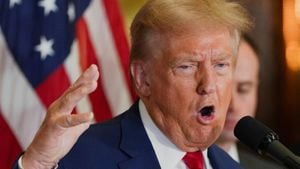Burkina Faso is making headlines with potential legal changes concerning capital punishment, as its military leaders are contemplating reinstatement of the death penalty. This development marks a significant reversal from the country’s previous abolition of capital punishment back in 2018. The debate surrounding the death penalty is intertwined with the military government’s broader legal reforms amid its struggle against armed groups.
The Justice Minister, Rodrigue Bayala, recently indicated during discussions about the new draft for the criminal code, "the issue of the death penalty, which is being discussed, will be implemented". This reiteration signals the government's commitment to evaluating the reintroduction of the death penalty, especially for serious offenses like terrorism.
When capital punishment was abolished, Burkina Faso was among several African nations beginning to distance themselves from such punitive measures. According to Amnesty International, the abolition reflected significant progress toward human rights within the region. Interestingly, the last recorded execution within the country dates back to 1988, marking decades of capital punishment's absence.
Now, the anticipated legislation will likely proceed to the Transitional Legislative Assembly (ALT) for potential adoption. Notably, the ALT consists predominantly of members appointed by the military junta, which raises questions about the legislative independence and integrity of such decisions.
The drive to reinstate the death penalty appears to be fueled by intense pressure on the military regime to demonstrate effectiveness against the rising tide of Islamist insurgents operating within Burkina Faso. The current junta, led by Captain Ibrahim Traore, took power following widespread dissatisfaction with the military's inability to address security challenges prevalent since 2015. Traore's regime has emphasized the need to combat these threats, and the resumption of executions could be seen as part of their strategy for deterrence.
This push for harsher penalties for terrorism-related offenses reflects broader trends observed across parts of Africa. Recent reports indicated there has been an uptick in executions on the continent, with Amnesty International highlighting a troubling rise of recorded executions more than tripling and death sentences increasing significantly across Africa.
Contrastingly, 24 Sub-Saharan African nations have abolished the death penalty entirely, setting Burkina Faso's potential reversal starkly apart from other regional developments. Some countries, such as Kenya and Zimbabwe, are even moving toward abolishing capital punishment altogether, showcasing alternative paths to justice.
Human rights organizations have expressed their concerns about the military government's direction, particularly citing increased restrictions on freedoms and rights within Burkina Faso. Activists argue the reinstatement of the death penalty could be used as political leverage, raising fears of how this action might affect the already fragile human rights situation.
Commentators also note potential legal contradictions should capital punishment be reinstated under the current regime. Article 6 of the International Covenant on Civil and Political Rights permits the death penalty with strict limitations. Still, the compromise of judicial independence could hinder the fair execution of justice, especially with reports of forced conscription and intimidation against magistrates and other judicial figures.
The international community has been closely monitoring these developments, with observers emphasizing the importance of adhering to international human rights standards. UN Human Rights Chief, Volker Türk, voiced his strong opposition to the death penalty, stating it contradicts fundamental human dignity and the right to life.
On the ground, citizens are grappling with the realities of insecurity and state response. The looming decision about the death penalty may reflect not just the government’s challenges with broadening its control, but also the extent to which it may politicize justice systems to maintain authority. This scenario presents complex dynamics as Burkina Faso navigates both internal and external pressures, seeking to balance security needs with human rights obligations.
With discussions about the death penalty heating up, Burkina Faso’s path forward seems fraught with tension. The intertwining of security issues, governance, and human rights creates challenging prospects as the junta attempts to assert its control amid competing interests of justice and societal stability. The world watches closely to see how Burkina Faso will respond to these pressing challenges.
This round of legal reforms raises questions about the future direction of the country as it faces internal strife and regional criticisms. Whatever path Burkina Faso chooses to follow, it will undoubtedly impact the lives of its citizens and the nation's standing within the international community.



